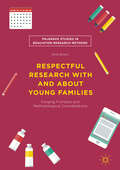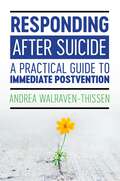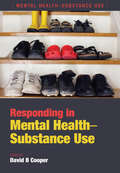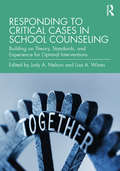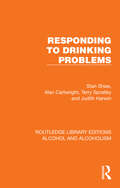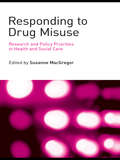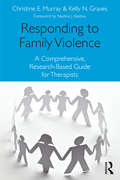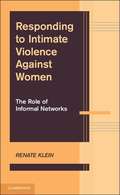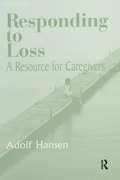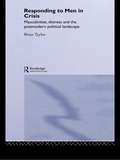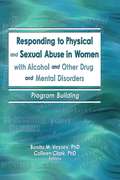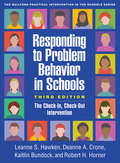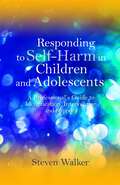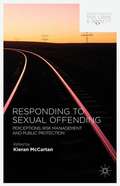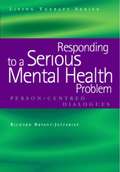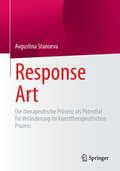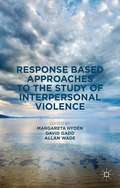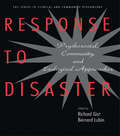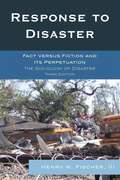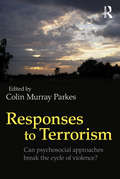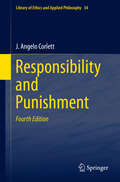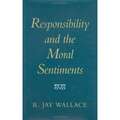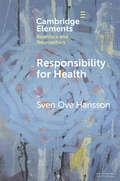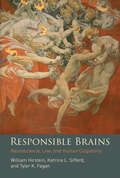- Table View
- List View
Respectful Research With and About Young Families: Forging Frontiers and Methodological Considerations (Palgrave Studies in Education Research Methods)
by Alice BrownThis book explores the distinctive theoretical and methodological features associated with conducting ethical and respectful research with young families, along with its unique considerations and challenges. With parents and young children understood to be both major players and ‘first educators’ in supporting childhood health, development and learning, this book examines how opportunities for research can be conceptualised within this privileged space. This volume embraces an interdisciplinary approach to this research, examining topics such as researcher identity and positioning, issues of consent, notions of power and relationships with families, methods for collecting data and frameworks for making sense of that data. Rather than providing concrete methods of practices and tools, this book will help raise the consciousness of researchers who are engaged in research with these young families. It is sure to appeal to students and scholars of education and early childhood development, as well as those concerned with conducting research ethically and respectfully.
Responding After Suicide: A Practical Guide to Immediate Postvention
by Andrea Walraven-ThissenThis practical guide about what first responders should do after a suicide, offers advice on identifying and recording a death as suicide, breaking the bad news and dealing with the impact of suicide in the short, middle and long term.Drawing on her own experience as a first responder and trainer, the author provides guidance and tips for best practice when responding to a suicide. These include what can happen to the body in the immediate aftermath, how to talk to the bereaved to limit or prevent secondary trauma, and how to manage suicide in public arenas such as schools. The scenarios covered include detailed scripts of how to deal with difficult situations. There are also sections that tackle complex issues such as religious or cultural customs, and unusual cases of suicide which can pose extra challenges.Straightforward and full of sage advice, each chapter includes real-world examples from the author's many years working as a first responder which highlight how suicide postvention techniques can be applied.
Responding in Mental Health-Substance Use (Radcliffe Ser.)
by David B. CooperMental health-substance use is a complex interrelation, with equally complex implications for individuals and their families, health professionals and society. Although its international recognition as an issue of critical importance is growing, clear guidance for professionals on mental health-substance use and its treatment is hard to find. The Mental Health-Substance Use series addresses this need, concentrating on concerns, dilemmas and concepts that impact on the life and well-being of affected individuals and those close to them, and the future direction of practice, education, research, services, interventions, and treatment. Having outlined the field and service development in previous books, the third book in the series explores how professionals can best respond to the particular concerns and dilemmas arising from and in mental health-substance use for individuals and their families. It aims to inform, develop and educate these responses by sharing knowledge and enhancing expertise in this fast-developing field by exploring the interrelated psychological, physical, social, legal and spiritual experiences. The volumes in this series are designed to challenge concepts and stimulate debate, exploring all aspects of the development in treatment, intervention and care responses, and the adoption of research-led best practice. They are essential reading for mental health and substance use professionals, students and educators.
Responding to Conflict in Africa
by Jane BouldenAfrica has been the source of some of the international community's most devastating failures and important successes in conflict management. The purpose of this book is to examine the issues and experiences associated with the increased level of activity between the United Nations and regional organizations in their efforts to address conflict in Africa. Using nine case studies and an overview of recent changes at the institutional level this book assesses what these experiences tell us about the United Nations, about African regional organizations, and about conflict management processes.
Responding to Critical Cases in School Counseling: Building on Theory, Standards, and Experience for Optimal Crisis Intervention
by Judy A. Nelson; Lisa A. WinesThis book helps school counselors and other school personnel navigate the complexities of the most common critical cases that are urgent and difficult in schools in the 21st century. Counselor educators who use this text will help trainees learn to take a methodical approach to critical cases and to be prepared for the difficult situations they will encounter including cases involving violence, cases of an existential nature, cases involving inappropriate adult behavior, and cases impacting the school community. After a description of the case, the reader is provided with the theories, standards, and experiences that are relevant to the case to formulate a response that is based on foundational principles of the school counseling profession. Contributing counselors from around the country explain what they do when critical cases present themselves, and this text provides their tools, wisdom, and professional judgments and offers training that embraces the reality of the school counselor profession to all counselors, educators, and trainees.
Responding to Drinking Problems (Routledge Library Editions: Alcohol and Alcoholism)
by Judith Harwin Stan Shaw Alan Cartwright Terry SpratleyIn the 1970s family doctors, social workers, researchers and administrators had been aware of the inadequacy of the response to drinking problems for some time. However, there had been no systematic examination of why such agents felt negatively about drinkers and disinclined to respond to them. Originally published in 1978, this book develops a radical new perspective on the prevalence and causes of drinking problems, combining reviews of historical and contemporary literature with the authors’ own research studies. This perspective is then linked to the need for an integrated response from both medical and social services, with a particular accent on the need for a community response. By focusing on the relationship between helper and helped a solution is sought to the question which has troubled the field for many years: why are agents like family doctors and social workers so inadequate in recognising and responding to people with drinking problems? The crucial aspects within the therapeutic relationship are pinpointed and experimental studies are described which show how training, casework, supervision and the redeployment of expertise can help improve recognition rates and responses to individual drinkers. This book thus expresses the need for major changes both in our attitudes and understanding of people with drinking problems and the difficulties of agents who try to help them. It should still be of historical interest to social scientists and those involved in helping people with drinking problems.
Responding to Drug Misuse: Research and Policy Priorities in Health and Social Care
by Susanne MacGregorResponding to Drug Misuse provides a unique insight into the current shape of the drugs treatment system in England. Reporting findings from research linked to the government's ten year drugs strategy Tackling Drugs to Build a Better Britain, the book places these in the context of policy, practice, and service development. It goes on to discuss the implications of these findings for the government’s new strategy Drugs: Protecting Families and Communities. Throughout the book contributors reflect on current debates on drug strategies and social policy and consider the relevance of the findings for policy and practice. Topics discussed include: recent trends in drug policy and how these link to crime responses of dedicated drug treatment services service users' perceptions and suggestions for improvement the impact of drug misuse on children, families and communities. This timely addition to the literature on drug misuse will be essential for substance use practitioners, including social workers, psychiatrists, psychologists and nurses. It will also supply helpful guidance for health and social care commissioners and policy providers.
Responding to Family Violence: A Comprehensive, Research-Based Guide for Therapists
by Christine E. Murray Kelly N. GravesThe comprehensive theory- and research-based guidelines provided in this text help answer the personal and professional questions therapists have as they provide competent clinical treatment to clients who have experienced family violence. It presents academic, scholarly, and statistical terms in an accessible and user-friendly way, with useful take-away points for practitioners such as clarifying contradictory findings, summarizing major research-based implications and guidelines, and addressing the unique clinical challenges faced by mental health professionals. Both professionals and students in graduate-level mental health training programs will find the presentation of information and exercises highly useful, and will appreciate the breadth of topics covered: intimate partner violence, battering, child maltreatment and adult survivors, co-occurring substance abuse, the abuse of vulnerable populations, cultural issues, prevention, and self-care. Professionals and students alike will find that, with this book, they can help their clients overcome the significant traumas and challenges they face to let their strength and resilience shine through.
Responding to Intimate Violence Against Women
by Renate KleinFamily members, friends, coworkers and neighbors are often the first to know that a woman has been abused by an intimate male partner. What is the proper course of action for those with knowledge of abuse? Using a wide range of empirical data from international sources, Renate Klein documents informal third parties as the first port of call, sources of support and interference, and gatekeepers to formal services. Family and social network members disrupt ongoing assaults, respond to disclosures of abuse and provide solace and practical help. These networks do not always side with victims, however, and may either sympathize with or actively support perpetrators. Klein illuminates the complexities of these contingent situations. Her analysis highlights the potential of informal third parties for effective intervention, demonstrating their significant role in promoting societies free from rape and domestic violence.
Responding to Loss: A Resource for Caregivers (Death, Value and Meaning Series)
by Adolf HansenReading this book, caregivers will find ways to increase their effectiveness by understanding more fully what their care receivers are experiencing, by finding creative ways to assist them in processing what is happening, and by working with them to discern responses to loss that are emotionally healthy, intellectually coherent, spiritually genuine, culturally sensitive, relationally authentic, and personally fulfilling.
Responding to Men in Crisis: Masculinities, Distress And The Postmodern Political Landscape
by Brian TaylorResponding to Men in Crisis is based on new research looking at gendered assumptions about rationality and men's mental health. It looks at postmodern theory in relation to masculinities and madness, and discusses key contemporary debates in political uses of risk, dangerousness and so on. The author relates this to a discussion of current policy and practice responses to men within the mental health system. It offers the reader a theoretical exploration of a topically and politically sensitive issues and is relevant to service user involvement and survivor movements, making it essential reading for academics and students of sociology and allied disciplines.
Responding to Physical and Sexual Abuse in Women with Alcohol and Other Drug and Mental Disorders: Program Building
by Bonita Veysey Colleen ClarkLearn from the experiences of these program sites to develop better services for women with co-occurring disorders and histories of violenceThis book explores the efforts of the Women, Co-Occurring Disorders and Violence Study to address the significant lack of appropriate services for women trauma survivors with co-occurring mental health and substance use disorders. Experts describe the services integration programs of nine participating sites that address the multiple needs of these women. In this guide, you will find useful strategies for integrating services that are responsive to the strengths and needs of the individual as well as the community.This vital resource examines how-over a period of five years-sites designed, implemented, and evaluated their interventions. You will learn how sites developed their strategies for integrating services at both the clinical/individual level and at the services or systems level. The book also shows how trauma-informed, gender-specific, culturally competent care fosters treatment that is sensitive to related issues such as children and parenting, interpreting culture cues, and socioeconomic difficulties. In Responding to Physical and Sexual Abuse in Women with Alcohol and Other Drug and Mental Disorders, you will learn about the details of nine different programs, including: Franklin County Women&’s Research Project-a collaborative project for rural women, designed and operated by local consumer/survivor/recovering women (CSRs) The Triad Women&’s Project-a semi-rural comprehensive system of care to respond to the needs of women and children The Women Embracing Life and Living (WELL) Project-interventions include trauma, parenting, systems integration and mutual help groups withIntegrated Care Facilitators providing resource coordination and advocacyservices PROTOTYPES, Centers for Innovation in Health, Mental Health, and Social Services-the three levels of integration the Systems Change Center implemented the Boston Health Commission-an integrated model of trauma-informed services culturally and linguistically appropriate for its service population of primarily poor Latina and African American women Palladia&’s Portal Project-a comprehensive trauma-informed intervention designed to put trauma and safety first to assist women remaining in treatment Arapahoe House&’s New Directions for Families-a family-oriented intervention for women and their dependent children Allies-comprehensive, integrated services for women as well as intervention for their children, ages 5-10The District of Columbia Trauma Collaboration Study (DCTCS)-a two-phase project addressing the needs of dually diagnosed women trauma survivors Responding to Physical and Sexual Abuse in Women with Alcohol and Other Drug and Mental Disorders provides you with first-hand accounts of the process by which programs and service systems were transformed. As challenges were met and strategy was adapted to "real world" situations, the sites discussed in this text found new and improved methods for helping this unique group of women. The book offers tips, solutions, and possibilities to mental health professionals, substance abuse professionals, and domestic violence professionals, and even patients and/or clients searching for support.
Responding to Problem Behavior in Schools, Third Edition: The Check-In, Check-Out Intervention (The Guilford Practical Intervention in the Schools Series)
by Leanne S. Hawken Robert H. Horner Deanne A. Crone Kaitlin BundockNow revised and expanded with the latest research and adaptations for additional target behaviors, this is the gold-standard guide to Check-In, Check-Out (CICO), the most widely implemented Tier 2 behavior intervention. CICO is designed for the approximately 10–15% of students who fail to meet schoolwide behavioral expectations but who do not require intensive, individualized supports. In a large-size format for easy photocopying, the book includes step-by-step procedures and reproducible tools for planning and implementation. At the companion website, purchasers can download and print the reproducible tools and can access online-only training materials, sample daily progress reports, and an Excel database for managing daily data. (Second edition subtitle: The Behavior Education Program.) New to This Edition *Chapters on CICO in alternative educational settings and for students with internalizing behavior problems. *Content on using CICO for attendance issues, academic and organizational skills, and recess behavior problems. *Chapter on layering additional targeted interventions onto CICO. *Chapter with specific recommendations for training and coaching school teams. *Expanded chapters on frequently asked questions, implementation in high school, and culturally responsive practices. *Supplemental online-only training and data management tools. *Updated throughout with current data and evidence-based procedures. See also Dr. Hawken's training DVD, Check-In, Check-Out, Second Edition: A Tier 2 Intervention for Students at Risk. Also available: the authors' work on intensive interventions for severe problem behavior, Building Positive Behavior Support Systems in Schools, Second Edition: Functional Behavioral Assessment. This book is in The Guilford Practical Intervention in the Schools Series, edited by Sandra M. Chafouleas.
Responding to Self-Harm in Children and Adolescents
by Steven WalkerSelf-harm is a growing problem in children and young people but it can be hard to understand and difficult to recognise. Responding to Self-Harm in Children and Adolescents will help professionals to understand self-harm and respond appropriately. It covers what the risk factors are, including social exclusion, and who is most likely to self-harm. Information on what self-harm is and what causes it, including mental health issues, problems in childhood and trauma, is included. The book also covers how to recognise self-harm and how to immediately respond in an emergency, and different intervention methods are explored. Finally, the author discusses means of support, including how parents and friends can help. This accessible guide provides clear and easily digestible information and practical advice to any professional working with a child or young person who is suspected of, or actually self-harming.
Responding to Sexual Offending
by Kieran MccartanThis collection brings together international contributors from multiple disciplines to discuss the current public, social and governmental understandings and responses to sexual violence. Exploring issues such as how to manage sex offenders, the volume provides recommendations for how to reduce offending and improve community engagement.
Responding to a Serious Mental Health Problem: Person-Centred Dialogues (Living Therapies Series)
by Richard Bryant-JefferiesThis book uses narrative to describe powerfully what is happening, interspersed with the counsellor’s thoughts and reflections. Sessions of supervision are also described and linked to what is occurring in the therapy. The first part of the book focuses on a client struggling to cope with her son who has mental health and drug problems. The second part describes the son’s experience of entering into a therapeutic encounter after having reached a crisis point. Cultural differences are also explored. Included in this volume is material to inform the training process of counsellors and many others who seek to work with people experiencing these relational dynamics. It is intended as much for experienced counsellors as it is for trainees. It provides real insight into what can occur during counselling sessions. The book will also be of value to the many healthcare and social care professionals who, whilst they may specialise in other areas, will find that the issues dealt with in this volume have impact on the work they are doing. For them, the text demystifies what can occur in therapy, and provides useful ways of working that may be used by professionals other than counsellors. Potential clients will also gain an insight into the process.
Response Art: Die therapeutische Präsenz als Potential für Veränderung im kunsttherapeutischen Prozess
by Avgustina StanoevaDieses Buch beleuchtet das Thema der künstlerischen Antwort (Response Art) in der Therapie. Die Arbeit vertieft sich im Thema durch Erfahrungen aus dem Einzel- und Gruppensetting basierend auf der Dynamik einer beantwortenden Beziehung (responsive relationship). In dem die Autorin ihre eigene künstlerische Arbeit in der Therapie als Forschungsobjekt betrachtet, veranschaulicht sie die Verwendung von Bildern der Kunsttherapeut*innen, die während und nach der klinischen Arbeit als Antwort entstehen. Mithilfe anschaulicher Beispiele gibt sie einen Überblick über die Entwicklung von Response Art als einen festen Bestandteil der klinischen Routinepraxis der Kunsttherapeut*innen.
Response Based Approaches to the Study of Interpersonal Violence
by David Gadd Allan Wade Margareta HydénInterpersonal violence has been the focus of research within the social sciences for some considerable time. Yet inquiries about the causes of interpersonal violence and the effects on the victims have dominated the field of research and clinical practice. Central to the contributions in this volume is the idea that interpersonal violence is a social action embedded in responses from various actors. These include actions, words and behaviour from friends and family, ordinary citizens, social workers and criminal justice professionals. These responses, as the contributors to this volume all show, make a difference in terms of how violence is understood, resisted and come to terms with in its immediate aftermath and over the longer term. Bringing together an international network of scholars and practitioners from a range of disciplines and fields of practice, this book maps and expands research on interpersonal violence. In doing so, it opens an important new terrain on which social responses to violence can be fully interrogated in terms of their intentions, meanings and outcomes.
Response to Disaster: Psychosocial, Community, and Ecological Approaches
by Bernard Lubin Richard GistFirst published in 2000. Routledge is an imprint of Taylor & Francis, an informa company.
Response to Disaster: The Sociology of Disaster
by Henry W. FischerResponse to Disaster combines the original research of author Henry W. Fischer, III with the literature used today to describe behavioral and organizational challenges commonly experienced before, during, and after disasters. Actual problems are presented and compared to those often misperceived to occur, known as disaster mythology. Fischer examines case studies conducted during the post-impact and long-term recovery periods of major and minor disasters worldwide. He asserts that the role of the mass media assists in eliciting needed help with an effective response, but also perpetuates disaster mythology. Fischer presents striking comparisons between the perception of disaster in the eyes of the general public, the actual situations emergency responders face, and the way mass media reporters broadcast information. Additionally, the problems encountered by emergency response organizations are compared and contrasted with general public and media perceptions of disaster response. Fischer presents the response to September 11, 2001, the south Asian tsunami, and Hurricane Katrina in this comprehensive third edition.
Responses to Terrorism: Can psychosocial approaches break the cycle of violence?
by Colin Murray ParkesWhy do responses to terrorist attacks often perpetuate cycles of deadly violence? Can an understanding of the psychology of these cycles help us to break them? Drawing on clinical experience of the care of people and communities affected by violence and disasters and on advances in cognitive and dynamic psychology, attachment theory, group psychology and thanatology, this ground-breaking work by a prominent and varied array of contributors casts light on the causes of terrorism, the reasons why responses to deadly attacks easily give rise to or maintain cycles of violence and some ways to prevent and interrupt these cycles. Using the violence in Northern Ireland and Rwanda as case studies throughout, Part 1, The Context of Terrorism, looks at the psychological and social influences behind extremism, terrorism and conflict. Part 2, Reponses to a Terrorist Attack, examines the responses that can feed a cycle of violence and assesses a range of approaches for their success in ending violence. Part 3, Breaking the Cycle, looks in depth at specific environments, influences and changes that can affect how violence can be prevented or mitigated, including the role of schools and the media and an examination of how peace processes were carried out in Northern Ireland and Rwanda. The book works to demonstrate how psychological responses to a terror attack can trigger unstable emotional responses and override judgement and to identify the five key points in a cycle of violence where change, for better or for worse, is possible. Ideal for psychiatrists, thanatologists, palliative care and bereavement staff, politicians and journalists as well as anyone with an interest in terrorism and its causes, this is a thought-provoking and accessible work on a highly topical subject.
Responsibility and Punishment
by J. Angelo CorlettThis volume provides discussions of both the concept of responsibility and of punishment, and of both individual and collective responsibility. It provides in-depth Socratic and Kantian bases for a new version of retributivism, and defends that version against the main criticisms that have been raised against retributivism in general. It includes chapters on criminal recidivism and capital punishment, as well as one on forgiveness, apology and punishment that is congruent with the basic precepts of the new retributivism defended therein. Finally, chapters on corporate responsibility and punishment are included, with a closing chapter on holding the U. S. accountable for its most recent invasion and occupation of Iraq. The book is well-focused but also presents the widest ranging set of topics of any book of its kind as it demonstrates how the concepts of responsibility and punishment apply to some of the most important problems of our time. "This is one of the best books on punishment, and the Fourth Edition continues its tradition of excellence. The book connects punishment importantly to moral responsibility and desert, and it is comprehensive in its scope, both addressing abstract, theoretical issues and applied issues as well. The topics treated include collective responsibility, apology, forgiveness, capital punishment, and war crimes. Highly recommended. "--John Martin Fischer, Distinguished Professor of Philosophy, University of California, Riverside.
Responsibility and the Moral Sentiments
by R. Jay WallaceWe need to understand what we are doing when we hold people morally responsible, a stance that Wallace connects with a central class of moral sentiments, those of resentment, indignation and guilt. To hold someone responsible, he argues, is to be subject to these reactive emotions in one's dealings with that person. Developing this theme, he offers an interpretation of the reactive emotions and traces their role in our practices of blame and moral sanction.
Responsibility for Health (Elements in Bioethics and Neuroethics)
by Sven Ove HanssonThis Element offers a broad perspective on responsibility for health. This includes responsibilities in the prevention of disease and accidents, and in the creation of healthcare for all. The professional responsibilities of physicians and nurses are explored, and so are the responsibilities that we all have for our own health. Many of the central problems in healthcare ethics are discussed from a responsibility perspective, for instance paternalism, informed consent, evidence-based medicine, alternative medicine, and the use of artificial intelligence in healthcare. In order to perform this analysis, conceptual tools for responsibility analysis are provided, such as the distinction between blame responsibility and task responsibility and various notions of causality that are relevant for our understanding of responsibility.
Responsible Brains: Neuroscience, Law, and Human Culpability
by William Hirstein Katrina L. Sifferd Tyler K. FaganAn examination of the relationship between the brain and culpability that offers a comprehensive neuroscientific theory of human responsibility. When we praise, blame, punish, or reward people for their actions, we are holding them responsible for what they have done. Common sense tells us that what makes human beings responsible has to do with their minds and, in particular, the relationship between their minds and their actions. Yet the empirical connection is not necessarily obvious. The “guilty mind” is a core concept of criminal law, but if a defendant on trial for murder were found to have serious brain damage, which brain parts or processes would have to be damaged for him to be considered not responsible, or less responsible, for the crime? What mental illnesses would justify legal pleas of insanity? In Responsible Brains, philosophers William Hirstein, Katrina Sifferd, and Tyler Fagan examine recent developments in neuroscience that point to neural mechanisms of responsibility. Drawing on this research, they argue that evidence from neuroscience and cognitive science can illuminate and inform the nature of responsibility and agency. They go on to offer a novel and comprehensive neuroscientific theory of human responsibility. The authors' core hypothesis is that responsibility is grounded in the brain's prefrontal executive processes, which enable us to make plans, shift attention, inhibit actions, and more. The authors develop the executive theory of responsibility and discuss its implications for criminal law. Their theory neatly bridges the folk-psychological concepts of the law and neuroscientific findings.
